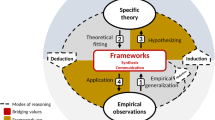Abstract
This article uses the concept of policy inaction to analyse data about the implementation of policy evaluations and public inquiries. Consequently, it produces outputs for two audiences. For those interested in policy learning and policy implementation the analysis identifies four ‘moments’ in which forms of inaction can influence the implementation of learned lessons in positive and negative ways. For those interested in policy inaction, these moments speak to a series of calls for further research about this emerging concept, which relate to the methodological challenges of knowing inaction, the need to explain how and why governments offload policy, and the need to explore the functional and dysfunctional effects of inaction. Taken together, these outputs contribute knowledge directly to three areas of the policy sciences: agenda management studies, policy implementation studies and, more broadly, efforts to understand policy learning.
Similar content being viewed by others
References
Alcoff, L. (2007). Epistemologies of ignorance: Three types. In S. Sullivan & N. Tuana (Eds.), Race and epistemologies of ignorance (pp. 39–57). State University of New York Press.
Bachrach, P., & Baratz, M. S. (1970). Power and poverty: Theory and practice. Oxford University Press.
Baumgartner, F. R., & Jones, B. D. (2009). Agendas and instability in American politics (2nd ed.). Chicago University Press.
Capano, G., & Howlett, M. (2020). The knowns and unknowns of policy instrument analysis: policy tools and the current research agenda on policy mixes. SAGE Open, 10, 1–13.
Douglas, S., Schillemans, T., ’t Hart, P., Ansell, C., Bøgh Andersen, L., Flinders, M., Head, B., Moynihan, D., Nabatchi, T., O’Flynn, J., Peters, B. G., Raadschelders, J., Sancino, A., Sørensen, E., & Torfing, J. (2021). Rising to Ostrom’s challenge: an invitation to walk on the bright side of public governance and public service. Policy Design and Practice., 4(4), 441–451.
Glynos, J., & Howarth, D. R. (2007). Logics of critical explanation in social and political theory. Routledge.
Gustafsson, G. (1983). Symbolic and pseudo policies as responses to diffusion of power. Policy Sciences, 15(3), 269–287.
Kahneman, D., Slovic, P., & Tversky, A. (Eds.). (1982). Judgment under uncertainty: Heuristics and biases. Cambridge University Press.
Lewis, C. (2012). A recent scandal: the home insulation program. In K. Dowding & C. Lewis (Eds.), Ministerial Careers and Accountability in the Australian Commonwealth Government. Canberra: ANU Press.
Lipsky, M. (1980). Street-level bureaucracy: Dilemmas of the individual in public services. Russell Sage.
McConnell, A., & ’t Hart, P. (2019). Inaction and public policy: understanding why policymakers ‘do nothing.’ Policy Sciences, 52(4), 645–661.
McConnell, A. (2020). The use of placebo policies to escape from policy traps. Journal of European Public Policy., 27(7), 957–976.
Peirce, C. S. (1965). Collected Papers of Charles Sanders Peirce (Vol. 2). Harvard University Press.
Pierson, P. (2005). Politics in time: History, institutions, and social analysis. Princeton University Press.
QPC. (2018a). Service delivery in remote and discrete Aboriginal and Torres Strait Islander communities: Final report. https://qpc.blob.core.windows.net/wordpress/2018/06/Service-delivery-Final-Report.pdf. Accessed 17 Sept 2019.
QPC. (2018b). Service delivery in remote and discrete Aboriginal and Torres Strait Islander communities: summary report. https://qpc.blob.core.windows.net/wordpress/2018/06/Summary-Report-Service-Delivery-Final-Report.pdf. Accessed 17 Sept 2019.
Queensland Government. (2018). Queensland Government Response to the Queensland Productivity Commission Inquiry into service delivery in remote and discrete Aboriginal and Torres Strait Islander communities. https://www.datsip.qld.gov.au/resources/datsima/publications/policy/qgov-qpc-response.pdf. Accessed 17 Sept 2019.
Rhodes, R. A. W., & Tiernan, A. (2014). Lessons in Governing: A Profile of Prime Ministers Chiefs of Staff. Melbourne University Press.
Sabatier, P. A., & Jenkins-Smith, H. C. (Eds.). (1993). Policy change and learning: An advocacy coalition approach. Westview Press.
Schattschneider, E. E. (1960). The semisovereign people: A realist’s view of democracy in America. The Dryden Press.
Stanner, W. E. H. (1969). After the dreaming: Black and white Australians: An anthropologist’s view (Vol. 1968). A.B.C.
Stark, A. (2018). Public inquiries, policy learning and the threat of future crises. Oxford University Press.
Stone, C. N. (1980). Systemic power in community decision making: A restatement of stratification theory. American Political Science Review., 74(4), 978–990.
Walton, D. (2014). Abductive reasoning. University of Alabama Press.
Weick, K. E. (1995). Sensemaking in organizations. Sage.
Wolfinger, R. E. (1971). Nondecisions and the study of local politics. American Political Science Review, 65(4), 1063–1080.
Acknowledgements
Aspects of this article were funded by the Australian Research Council Discovery Project (DP180103983)
Author information
Authors and Affiliations
Corresponding author
Additional information
Publisher's Note
Springer Nature remains neutral with regard to jurisdictional claims in published maps and institutional affiliations.
Rights and permissions
About this article
Cite this article
Brown, P.R., Stark, A. Policy inaction meets policy learning: four moments of non-implementation. Policy Sci 55, 47–63 (2022). https://doi.org/10.1007/s11077-021-09446-y
Accepted:
Published:
Issue Date:
DOI: https://doi.org/10.1007/s11077-021-09446-y




